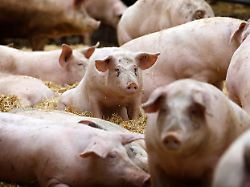Foodwatch: Hardly any healthier
According to the study, animals suffer just as much on organic farms
01/17/2023 12:04 p.m
According to studies, almost 40 percent of pigs in conventional husbandry are sick. According to Foodwatch, however, the number on organic farms is hardly lower. Udders of dairy cows are particularly often inflamed there. Consumer advocates are demanding consequences for subsidies.
Whether fattening barn or organic farm – according to a study by the consumer organization Foodwatch, the type of husbandry makes no fundamental difference in terms of the health of livestock. “There are sick and injured animals on small organic farms as well as in large animal factories,” explained Annemarie Botzki from Foodwatch. Stable management is therefore crucial. Foodwatch called for agricultural subsidies to also be based on the health data from livestock farms.
The evaluation of veterinary studies has shown that almost 40 percent of all pigs in conventional husbandry show pathological findings such as pneumonia, open wounds or abscesses. In organic farming, however, it is hardly less at 35 percent. Diseases on the hooves were found in 39 percent of all dairy cows – regardless of whether they were on conventional or organic farms. In organic stables, inflammation of the udder can even be observed particularly frequently.
According to Foodwatch, the situation for laying hens is particularly bad: up to 97 percent of the hens have broken bones. According to the studies, the problem here lies primarily in breeding. Against this background, consumer advocates criticize Agriculture Minister Cem Özdemir’s plans for mandatory labeling for animal products. The so-called animal welfare label should initially only apply to pork and make it clear to consumers how the animals are kept. It will later be expanded to include processed products and other livestock.
Researcher calls for systematic data collection
This approach bypasses the problem, “because whether chickens, pigs or cows are healthy does not simply depend on whether the barn is a few centimeters larger or there is straw on the floor, but also crucially on the farmer’s barn management.” , explained Botzki.
“Many farms have health management well under control, while others keep having problems with sick and injured animals,” said Albert Sundrum, former head of animal nutrition and animal health at the University of Kassel. The solution therefore does not lie in specifications for the type of husbandry, but in the systematic collection of health data for each individual farm.
Foodwatch suggested that the system of agricultural subsidies should also be based on this data: “Farms with poor animal health must be advised and asked to make improvements. For farms with repeated poor results, there must be consequences, such as the reduction of agricultural subsidies.” Model companies, on the other hand, could be rewarded with higher prices for their products.
